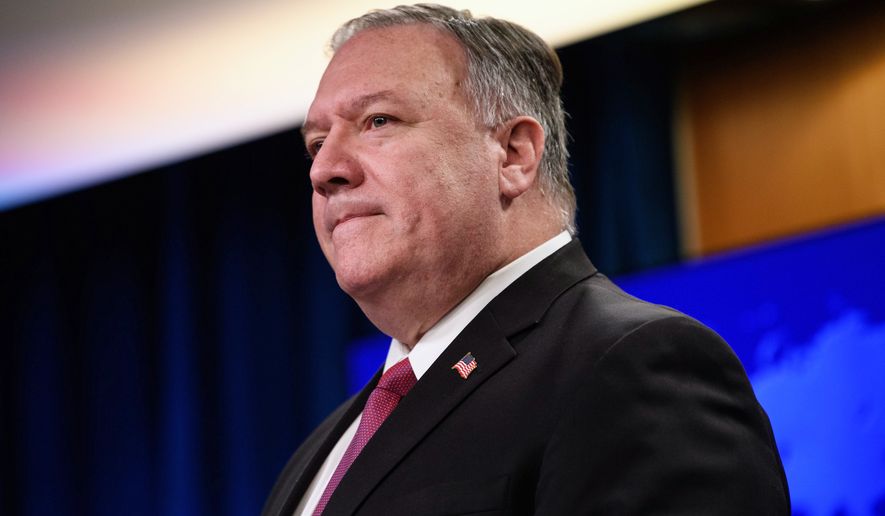Secretary of State Mike Pompeo departs Sunday for a six-day, four-country visit to Asia, where he will meet with regional leaders on defense and security issues. Growing concerns about China are likely to be front and center.
Mr. Pompeo will first take part in defense and security talks in India along with Defense Secretary Mark Esper and their Indian counterparts.
The secretary will then visit the Indian Ocean island states of Sri Lanka and Maldives before traveling to Indonesia.
“We’re looking forward to strengthening critical relationships with our friends and partners, emphasizing our deep commitment to the Indo-Pacific and advancing our vision for the long-term partnership and prosperity in the region,” Dean R. Thompson, principal deputy assistant secretary of state for South and Central Asian affairs, told reporters.
Mr. Pompeo joined top ministers from India and Australia in Tokyo this month seeking to forge a closer partnership amid mutual concerns about Chinese encroachment in the region. The four powers, known as the “Quad,” have been discussing ways to coordinate military and economic policy to constrain Beijing.
The United States has been pressing China in strategic waterways off the Chinese coast in a bid to counter Beijing’s claims to vast areas of the heavily trafficked South China Sea.
Mr. Thompson said the pace and scope of relations with India is accelerating, in part as a result of growing concerns that New Delhi has regarding China. The two Asian giants had a deadly clash this summer over a long-running border dispute, which remains unsettled.
The “2-plus-2 talks” with Mr. Pompeo and Mr. Esper in New Delhi are expected to discuss that confrontation, which took place in the disputed northern region of Ladakh high in the Himalayas, Mr. Thompson said.
The United States is seeking to cement a stronger strategic partnership with the government of Prime Minister Narendra Modi, who has forged a personal partnership with President Trump, U.S. officials said.
Responses to the COVID-19 pandemic are also expected to be among the discussions. The U.S. and India have the two highest reported caseloads in the world.
Indian troops clashed with Chinese forces in June along the high-altitude border area known as the Galwan Valley.
The troops used sticks and clubs in the fight, resulting in the deaths of 20 Indian soldiers and unknown number of Chinese troops. It was the first deadly border clash since 1975.
The military battle erupted amid growing tensions between Mr. Modi and Chinese President Xi Jinping. India recently banned a number of popular Chinese apps, citing data spying concerns.
The United States has sold eight new P-8 maritime patrol aircraft to India.
One glitch in defense ties between the United States and India was New Delhi’s decision to purchase S-400 air- and missile-defense systems from Russia, which has long been a supplier to the Indian military. The United States is opposing the sale but has not offered the comparable Terminal High-Altitude Area Defense System as a substitute.
After India, Mr. Pompeo will travel to Colombo for meetings with senior Sri Lankan leaders on security in the region. Mr. Thompson said the meetings in Sri Lanka will focus on developing close economic ties with the island nation and “our shared commitment to democracy.”
Regional maritime security cooperation also will be pursued.
In the Maldives, Mr. Pompeo will seek to cement growing ties.
Maldives’ government recently announced that it may cancel a free trade agreement with China to improve trade with other states, such as India. The government also has been restricting ties with Beijing.
Mr. Thompson said the United States cooperates with Maldives on regional security issues and combating terrorism.
David R. Stilwell, assistant secretary of state for East Asian and Pacific Affairs, said Mr. Pompeo will meet with the Indonesian president and foreign minister in Jakarta.
“Indonesia is important for a lot of reasons, not least [because] it’s the world’s most populous Muslim nation and it’s a pillar of free and open Indo-Pacific,” Mr. Stilwell said at a briefing for reporters. “It’s in a very key and strategic location.”
Washington and Jakarta share the vision for a rules-based international order in the region, he said, noting a strong, bilateral defense and counterterrorism partnership.
China has been seeking to woo Indonesia with offers of its coronavirus vaccine, but Mr. Stilwell noted that Indonesia recently pushed back against illegal fishing by Chinese vessels within the Indonesian economic zone. Indonesia is one of a number of countries on China’s periphery that have complained about aggressive moves by Beijing.
Mr. Thompson and Mr. Stilwell did not comment when asked about Indonesia’s reported decision to deny the refueling of Navy P-8 patrol aircraft in Indonesia.
Mr. Stilwell said the recent U.S. decision to declare China’s expansive maritime claims to owning most of the South China illegal benefits Indonesia.
“You’ve seen Indonesia has pushed back on Chinese ships fishing its in its [exclusive economic zone] illegally,” Mr. Stilwell said.
“There are things that we have done to empower these countries to push back.”
• Bill Gertz can be reached at bgertz@washingtontimes.com.




Please read our comment policy before commenting.